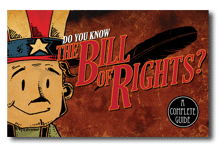In fact, this is who is embarrassing Virginia and threatening everyone’s individual liberties. The story, as reported earlier this month: Laura George, formerly a Leesburg attorney, planned to build an interfaith retreat center near her home in the southwest Virginia town of Independence. The Grayson County Planning Commission unanimously approved her project, which included a public library, interfaith education center, and ten cabins. There was a public hearing.
Tag Archives: Constitution
And you think this is a virtue?
Crossposted at Equality Loudoun.
It’s not online, but Leesburg Today has a piece on a recent Community Levee Association essay contest, and the winning essay is on their site. CLA president Chris Stevenson tells the Leesburg Today “we thought there were pretty good deep insights into marriage, especially for a 12th grader.” The author makes a strong case for the emotional difference between marriage and something that falls short, disputing the idea “that cohabitation is a reasonable substitution for marriage.”
An Anniversary of Equality
A few days ago, we celebrated Independence Day, and remembered the document that asserted our Freedom from British tyranny. Today is a less known anniversary, an anniversary of the day that equality was enshrined in our Constitution as a principle on par with liberty. Today is the 143rd anniversary of the ratification of the 14th Amendment. More than any other Amendment to the Constitution (with the exception, of course, of the 13th Amendment) the 14th Amendment has been the Constitutional foundation of America’s progress over the past 100 plus years.
The Library of Congress provides an excellent summary of the 14th Amendment.
The 14th Amendment to the Constitution was ratified on July 9, 1868, and granted citizenship to “all persons born or naturalized in the United States,” which included former slaves recently freed. In addition, it forbids states from denying any person “life, liberty or property, without due process of law” or to “deny to any person within its jurisdiction the equal protection of the laws.” By directly mentioning the role of the states, the 14th Amendment greatly expanded the protection of civil rights to all Americans and is cited in more litigation than any other amendment.
The power of the 14th Amendment echoes through the eras, as evidenced by unconstitutional opposition to birthright citizenship for our neighbors with parents from Latin America. It provides the black-letter Constitutional basis for Federal government enforcement of civil rights within the states, much to the chagrin of Texas and, in some cases, Virginia. And it originated that inestimably wonderful phrase, “equal protection of the laws.” Where prior to the 14th Amendment, the equality of citizens under the laws had been assumed, but not truly honored, the 14th Amendment creates and affirmative duty of government to ensure the equality of all under the law.
Ever since its passage conservative interests (first, in the Democratic Party, and later in the Republican Party) have sought to undermine, eviscerate and minimize the 14th Amendment, but it remains a core part of the fundamental law of the land, and the basis of legal equality and progress in the 20th century.
It was the 14th Amendment that made Brown vs. Board possible. It is the 14th Amendment that calls marriage discrimination into real question. It is the 14th Amendment that forms the Constitutional foundation for progressivism in all its modern incarnations.
And so, today, I celebrate the anniversary of the ratification of the 14th Amendment. Ratified, it should be remembered, by Republican states and a Republican Congress. America is better, and stronger, and more just for the 14th Amendment, and I celebrate that today.
Originalism is a Logical Fallacy
I’ve always been fundamentally uncomfortable with the theory of original intent. Ever since learning about Constitutional interpretation from Professor Abraham at UVA, the idea that our Constitution should be interpreted as the people who wrote its constituent parts would have intended just did not sit right with me. And it wasn’t just because different authors had different intents in ratifying the exact same language at the time of passage. Last night, I realized why Originalism bugged me.
At its most basic, the theory of original intent for Constitutional interpretation is nothing more than an argument from authority, one of the most simple and fundamental logical fallacies. Indeed, it is a prime example of the special case of the argument from authority: the argument from antiquity.
As such, interpreting the Constitution based on original intent is building a house on a foundation of sand. All the reasoning on top of the interpretation may be consistent, and closely argued (and most of our Justices are excellent at constructing such reasoned arguments), but if the interpretation stands solely on the assertion that “the original authors meant this,” then it is assuming that the wisdom of the original authors is greater, and of more authority, than the wisdom of people today.
And if that were true, if the wisdom of the old were always better than the wisdom of the new, then it would be impossible to justify any changes to the Constitution, whatsoever! The mere fact that we have Amended the Constitution, and made our nation a “more perfect union” as a result, time and time again (27 times at last count), provides strong evidence that the wisdom of those earlier authors was insufficient, and required revisions based on new knowledge and understanding.
I’m not a lawyer, but the Constitution does not belong to lawyers and judges. It belongs to all of us. What it is, and what it means, is the property of every American, not just those with special knowledge and training. I believe, and believe strongly, that a correct interpretation of the Constitution is based not solely on what the authors intended, but also on where America stands today, and where we are in the arc of history towards justice.
But that’s just my opinion. I don’t claim to be an authority.

